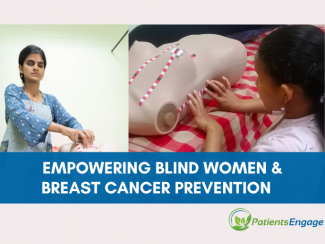
Discovering Hands initiative in India is a project that empowers visually challenged women to find a foothold in the medical world as Medical Tactile Examiners in the area of breast cancer by examining women for early detection and hence a reduction in the mortality rate. Moyna Sen speaks to three organizations NAB India Centre for Blind Women, New Delhi, Enable India, and CyteCare Hospitals as well as the Medical Tactile Examiners to understand how they all came together to make this initiative a success.
NAB India Centre for Blind Women in New Delhi led by Shalini Khanna Founder-Director of NAB India played a crucial role in collaborating with Discovering Hands(DH) in Germany, helping train the first batch of visually impaired women as Medical Tactile Examiners (MTEs).
Why did your organization decide to tie up with Discovering Hands?
Discovering Hands is a brilliant path for blind women to use their unique talents and join the healthcare profession, where trained visually impaired women will serve the health sector, identify even the slightest breast anomalies at an early stage in women, aiding in the early diagnosis of breast cancer and decreasing Breast Cancer mortality rate in India.
How did it come about?
In order to assess the viability of Discovering Hands in India, Mrs. Shalini Khanna (Founder/Director, NAB India Centre for Blind Women) and Dr. Kanchan Kaur (Director, Breast Services, Medanta-The Medicity) were invited by DH Germany in 2016. They were both convinced and eager to introduce this training and screening method to India and bring a paradigm shift to the status of blind women in India. In 2017, NAB India Centre sent its first group of trainers to Germany for 45 days of training. The first group of MTEs got certification in June 2018. The examination panel included Dr. Frank Hoffmann (Founder of Discovering Hands).
Please tell us about how you put this into effect?
After the 45 days of Train-the-Trainer course, the NAB India Centre trainers implemented the training in India. Each training batch is for 9 months (6 months of theory & practical training and 3 months of clinical internship in a hospital). Then, an examination panel of German trainers along with Indian Master trainers take the practical exam and certify the MTEs.
How successful was the collaboration?
The program is accepted by women in general in India very readily and they find it detailed and yet feel that their privacy is protected. The doctors find it pathbreaking. We already have 22 certified MTEs working to promote breast cancer awareness and screenings for breast cancer at hospitals and camps.
What have been the biggest challenges of the programme? Was it difficult to accommodate a programme that originated in Germany? Cultural differences that you had to work around? Were there challenges in getting blind women into the program?
- The major issue facing the programme has been securing funding for the training and placement in hospitals. As we spend approximately 2.5 Lakh on each candidate, this training programme is highly expensive. Additionally, because they believe that a blind person will be a liability for them, hospitals and doctors are not always willing to accept them. However, they are particularly good at adjusting the technique in their clinical practice, once they begin working with the MTEs.
- It is challenging to arrange the training in India because people don't study science in their schools and English is not a widely spoken language which is the medium of instructional material for the course
- Before beginning the actual instruction, we need to conduct pre-training in both computer skills and English.
- Also it's not easy to reach the blind women with information about the course as they are remotely located and don’t have access to information over internet.
- We really needed to make some changes to emphasize the value of a breast checkup because women in India still don't view it as a crucial aspect of their health. To overcome the taboo surrounding discussing breast health, we started conducting awareness sessions in corporate settings and RWAs.
- Till date it is a challenge to get blind women into the program because this is a very intensive training program and requires certain skills to clear the 5-day assessment. Hence, very limited candidates apply for the training.
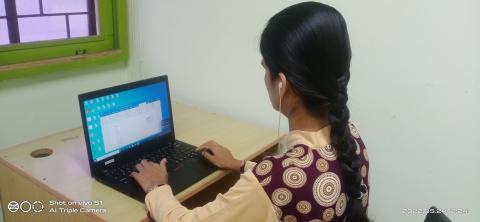
Please share with us an implementation case study with a hospital
For MTE's internship and placements, Medanta- The Medicity, Gugaon, Haryana, has functioned as the implementing hospital. Dr. Kanchan Kaur, Director of Breast Services, and her colleagues ensured that the majority of women who visited the hospital underwent Tactile Breast Examinations by Blind MTEs. MTEs were seeing patients for post-treatment follow-up appointments of breast cancer patients. Some of these patients suggested that their loved ones do the same.
Have you been able to increase adoption with other hospitals?
- Medanta-The Medicity, Gurgaon, Haryana
- Fortis Flt Lt Rajan Dhall Hospital, Vasant Kunj, New Delhi
- Tata Memorial Hospital, Parel East, Mumbai
- CK Birla Hospital for Women, Gurgaon, Haryana
- CyteCare Cancer Hospital, Bangalore
- Nepal Mediciti, Kathmandu
How can people with vision problems support this programme.
To help the programme, persons can take up two roles:
i) Apply to be an MTE.
ii) Spread information about the initiative.
- Bangalore has been added to the training area. Enable India is implementing the training in Bangalore.
- In order to reach the women in rural India, we are collaborating with several tele-medicine facilities.
- Additionally, we are talking to hospitals about hiring at least 1 MTE for the facility.
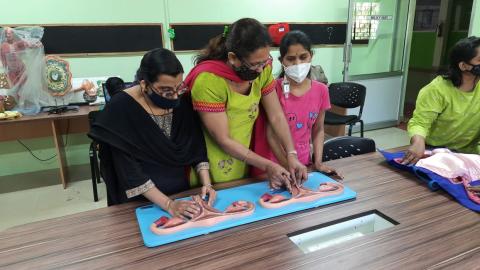
Enable India, an organisation that works in the field of employment of the disabled, tied up with Discovering Hands to bring in more women without vision into the fold. Shalini Jacob, Program Head of Enable India shared their experience:
Why did your organisation decide to tie up with Discovering Hands?
‘Discovering Hands’ is a wonderful initiative that not only helps in the early detection of breast cancer but also provides meaningful employment to visually impaired women in the ‘Health and wellness sector’.
Enable India was introduced to this program by National Association for Blind (NAB), Delhi.
As the saying goes ‘It takes a village to bring up a child’, this program is a true example of that. One of our sighted trainers was trained in Germany and the other one was trained under ‘Train the trainer’ program in Delhi. Continuous guidance was provided by the team in Germany and NAB Delhi, which plays the role of an educational partner in India. All training material was shared by Germany and the final written and practical examination for the candidates is also conducted by the German team.
How successful was the collaboration? Please tell us about it.
It was a successful collaboration especially given that the first batch was during the Covid pandemic. Unfortunately, the duration of the course had to be extended due to the lockdowns.
What has your organisation achieved from this and how are you expanding the Breast Cancer Awareness programmes?
The visually impaired candidates who qualified under the program are currently affiliated with a Cancer hospital and camps are also being organised for corporates to do breast cancer screenings.
What have been the biggest challenges of the programme? Was it difficult to accommodate a programme that originated in Germany? Cultural differences that you had to work around? Were there challenges in getting blind women into the program?
The main challenge has been that visually impaired students in India are not allowed to pursue science stream after a certain level, so the candidates had to be taught science through special educators and tactile models which made the program quite intense. We also had to hone their mobility, English and computer skills.
Cultural differences – ‘Breast’ and ‘Cancer‘ are taboo words in the Indian context and it will take time to normalise such conversations. We did community engagement programmes and social media campaigns to spread awareness .
The challenge in getting visually impaired women for the program is that the dropout rates are high due to candidates wanting to get married, or get into government jobs etc.
Have you been able to increase adoption with other hospitals?
We have found the hospital to be receptive of this methodology, and all our qualified students got internships at the end of the program.
Please share with our readers how people with vision problems can join this programme.
Visually impaired women with English speaking skills and basic computer knowledge can pursue this program.
What is the feedback from women whose breasts have been examined by the trained blind staff?
We have received extremely positive feedback from the women who got the examination done. They found it to be done professionally and since it’s non-invasive and has no side effects, they were comfortable getting it done periodically.
Plans to scale
Plan to scale is a two-pronged approach. We have already started our second batch of trainees in Bangalore and we intend to train our 2 trainers for ‘Train the Trainer’ program so that we can train more sighted trainers and run multiple batches for training the visually impaired candidates. We intend to scale the program at a national level.
Amit Sharma, Chief Information Officer and Head – Partnerships & CSR at Cytecare Cancer Hospitals, Bangalore, speaks about the implementation of the Discovering Hands programme in their organisation
How did your hospital get involved in the project?
I was introduced to this concept by Ms Shalini Jacob from Enable India who reached out to me to seek our view on possible support for this initiative.
What was the thinking behind it?
Two things specifically are core to this project- First to support inclusivity at any workplace as much as possible and use of visually impaired women fits perfectly in that regard. Second was more in line with our hospital aim of increasing awareness about breast cancer and increase breast cancer screenings as much as possible. We felt that If this concept can work, we can take screening at everyone’s doorstep rather than asking them to come to hospital
How were the women recruited?
Recruitment of the women is by Enable India based on their parameters and Cytecare does not have a role in that
What were their incentives?
I think the first and foremost incentive is to get them out of their homes and get to a workplace where they can interact and get used to social interactions.
Other incentives were stipends being provided to the women during their training period apart from taking care of their boarding and lodging. And upon completion of their trainings, these women were absorbed as Certified Medical Tactile Examiners in Cytecare, besides being paid a salary, together with their boarding and lodging. We have also created an incentive structure for them where they are paid for every screening performed by them. I think the biggest incentive is the sense of empowerment and providing them with a purpose of their life.
What were the difficulties of training them?
Most of these women are low in confidence due to long phases of isolation of being confined to their homes. Enable India had to work on making them confident individuals within the span of a year. Also they were required to be taught the use of technology like laptops and mobiles as also learning medical terminologies which was all a part of their training. They were also required to engage in long conversations with people undergoing screenings and that required a different skill set which was also taken care of.
What are the positives of blind women being employed for breast examination?
The first thing that immediately comforts many women is that they are able to maintain their privacy when they are with these women. Also they are extremely caring and gentle and their conversations also bring a sense of calm amongst those who are undergoing screening. They also bring a sense of positivity into the entire system and people feel motivated to see them behaving so normally inspite of their disability, which is a huge motivation for many of the anxious minds within a hospital.
How accurate have been their examinations?
They have been able to find almost all possible detectable lumps and nodes in women’s breasts when they have examined them, which is what is expected out of them. The next stage in the screening is to refer to an Oncologist in their report submitted to doctors if they find anything unusual.
How do your clients feel about breast examination being done by blind people?
We have got great reviews about their work. Women have really appreciated this concept and were very comfortable in undergoing clinical breast examination with them. They have been to a few corporate camps also and it has been a great experience for everyone working with them.
Future plans.
We plan to work with Enable India to train more of such women so that they are able to be employed by more hospitals in not only screening initiatives but also possibly in some cancer awareness initiatives also as they can very comfortably explain the importance of breast screening to women in community based settings. We hope to reach out to many more corporates to support this initiative which can even align with their inclusivity targets.
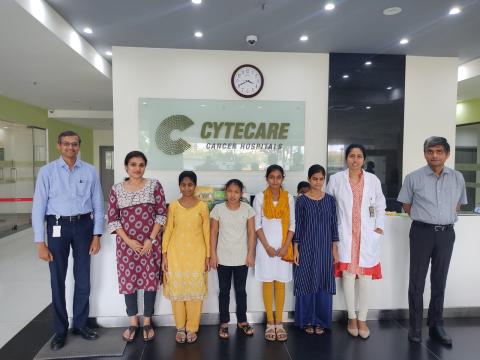
Anything that you would like to share.
The best thing that I remember is hearing from Noor and Ayesha why they love this program. They always dreamt of working in the medical field despite their disability. By becoming a Medical Tactile Examiner, they not only feel closer to the dream, but also something with which they would be able to save more lives.
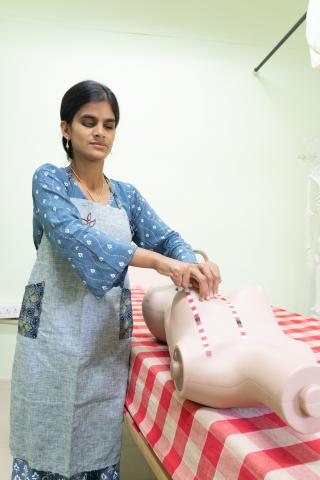
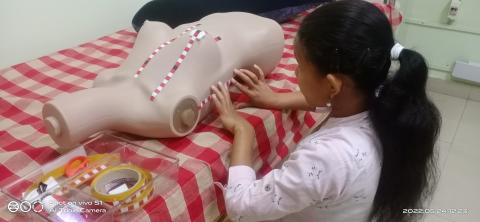
Medical Tactile Examiners Ayesha Banu and Noorunissa share their experiences of being a part of the Discovering Hands project
Ayesha Banu, Medical Tactile Examiner - Discovering Hands
According to me, the Discovering Hands program's journey is completely different from the journeys of other professions because it was full of challenges and learnings during the Covid situation.. I've been excited about this training the entire way. In any challenging circumstance, I was a person who didn't like to back down. For the first time, I learned how to create new acquaintances, and happily, the friendship I chose to form worked out. I always assumed that practical sessions in my DH sessions would be simple, but they weren't. It took a lot of mental and physical power and patience for me to do even one screening per day. However, because I was interested in it and had my trainer's support, I didn't give up, and very quickly, I achieved my first accomplishment by finishing 1 screening per day during training. When I had to speak in front of a group of four people to complete my final practical exam, my fear of public speaking surfaced. This job requires confidence and self assurance, as also patience which I gradually gained while talking to patients during the screening sessions. . As a consequence of my dedication, I am now able to do 7 screenings a day, and I am also proud of the successful screening results.
Noorunissa, Medical Tactile Examiner - Discovering Hands
I was afraid to try new things when I initially joined Discovering Hands, and I also lacked the self-assurance to speak out. However, my trainers helped me overcome this concern by arranging numerous brainstorming sessions in which I could participate. I also engaged in a few other exercises to increase my energy. My computer and mobility skills also got better. I gained a great deal of knowledge about human anatomy and medical terminology. I was engaged in a role-playing exercise (patients-MTE role) during the sessions.
Learnings and experience during internship: I spent 3 months working as an intern at the Cytecare Hospital. It was a very beneficial experience for me because I learned how the hospital is set up and how to deal with difficulties. I learned about various breast problems as we conducted patient screenings and I grew more assured in my ability to complete my work. I also paid attention to time management and effectively communicated with patients. I even learned how to regulate my emotions around patients. My visit to the OT was quite instructive in that it exposed me to actual cancer lumps in genuine patients, which helped me carry out my subsequent examinations successfully. I am independent due to my professional employment by working as a Medical Assistant (Medical Tactile Examiner) under Breast Oncologists at Cytecare Hospitals. I am financially supporting my family which I am proud of. Being a person with vision impairment and working as a healthcare professional is a new chapter for me.






